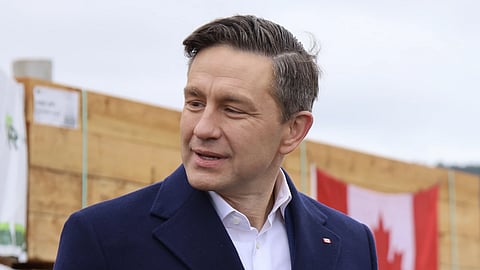

Opposition Leader Pierre Poilievre has condemned the Liberal government’s approach to drug policy, calling it a failure that has worsened the overdose crisis.
Blacklock's Reporter says he criticized the millions spent on decriminalization in British Columbia and supervised consumption sites across Canada, arguing those funds should have been redirected to treatment and recovery programs.
“I said this policy of decriminalizing and handing out drugs on our streets was a disaster,” Poilievre told reporters.
“The Liberals attacked me mercilessly for it, saying it was cold-hearted and mean. But what was truly cold-hearted and mean was leaving people to die in tent cities from overdoses.”
Poilievre argued that the Liberal government’s “radical drug policies” have led to devastating consequences, pointing to British Columbia as an epicenter of the crisis.
He also highlighted statements from Liberal candidates in Yukon and Victoria supporting further decriminalization, which he described as part of a dangerous “radical drug agenda.”
In 2023, the Commons rejected a Conservative motion to overturn what Poilievre called the government’s “deadly policies” and redirect taxpayer funds toward addiction treatment. He said recent data confirmed his warnings were correct.
“Ban the drugs, stop giving out tax-funded opioids, shut down drug consumption sites, and put the resources into treatment and recovery,” he said. “We need detox, counseling, group therapy, physical exercise, yoga, sweat lodges for first nations, job placement, and housing to get people off the streets and into homes.”
Between 2017 and 2022, the government spent $820 million on its Canadian Drugs and Substances Strategy, according to official estimates. A 2023 report from the Department of Health acknowledged the program had “minimal” impact.
“Deaths from opioid toxicity reached record levels in 2020 and 2021,” stated the report Horizontal Evaluation Of the Canadian Drugs And Substances Strategy. “Since then opioid-related deaths have remained higher than pre-pandemic levels.”
On May 7, the federal cabinet ended its three-year experiment with decriminalization in British Columbia, which had allowed personal possession and public use of up to 2.5 grams of cocaine and other narcotics. The decision followed complaints of public disorder, and prosecutions resumed after 15 months.
Data from the B.C. Coroners Service showed a rise in overdose deaths during the decriminalization period. Fatalities totaled 3,313 over the 15 months compared to 2,843 in the 15 months prior, marking a 16.5% increase.
The government also eliminated the position of Minister of Addictions on March 14. Liberal MP Ya’ara Saks (York Centre, Ont.), the last to hold the role, told the Commons health committee on December 17 that cabinet had lost interest in drug decriminalization. “The only party that is preoccupied with decriminalization is really the Opposition,” she testified.
